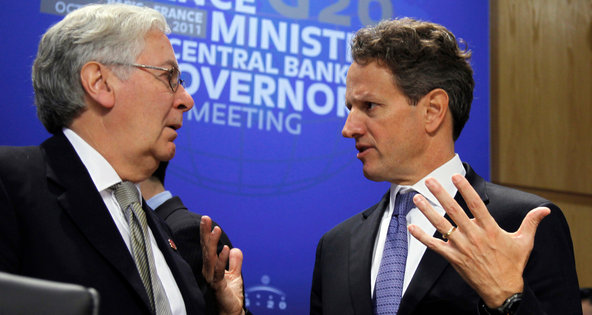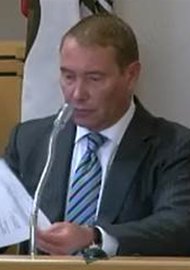 Pool photo by Charles PlatiauMervyn A. King, left, the Bank of England governor, and Timothy F. Geithner, the Treasury secretary, in Paris in 2011.
Pool photo by Charles PlatiauMervyn A. King, left, the Bank of England governor, and Timothy F. Geithner, the Treasury secretary, in Paris in 2011.
LONDON – American authorities did not warn British officials about the rate-rigging scandal at the height of the financial crisis in 2008, according to documents released by the Bank of England on Friday.
The e-mails from the British central bank shed new light on conversations between Mervyn A. King, the Bank of England governor, and Timothy F. Geithner, who was head of the Federal Reserve Bank of New York at time of the discussions.
The documents will increase pressure on American and British officials, who have come under mounting scrutiny from politicians about why they did not respond more quickly to potential illegal activity at some of the world’s largest banks.
Related Links
Paul Tucker, the deputy governor of the Bank of England, talked to Barclays and a number of other global banks during 2008 about potential problems with how the London interbank offered rate, or Libor, was set, according to documents released on Friday. Despite the conversations, some traders and senior executives at Barclays continue to alter the rate until 2009.
The e-mails outline the Bank of England’s discussions with both the New York Fed and the British Bankers’ Association, the London-based trade body that oversees Libor. The conversations center on concerns about how the rate was set.
Libor Explained
The documents also called on the British Bankers’ Association to conduct a review, including input from international government agencies, to ensure the credibility of the rate.
“I don’t see that a group of junior bankers in London can decide this without a global debate,” Mr. Tucker wrote in an e-mail in May 2008.
The call for a review into Libor in 2008 came after Mr. King and Mr. Geithner had talked about potential problems with the rate during a meeting in Basel, Switzerland, in early May 2008.
This discussion was followed by a flurry of e-mails a month later in which Mr. Geithner, who is now the Treasury secretary, recommended changes to the rate, which is used as a benchmark for more than $360 trillion financial products worldwide.
The suggestions included ‘‘strengthen governance and establish a credible reporting procedure’’ and ‘‘eliminate incentive to misreport,’’ according to documents released by the New York Fed.
Mr. King told Mr. Geithner that he supported the suggestions. Yet the New York Fed did not make any allegations of wrongful behavior connected to Libor, according to documents released on Friday. Mr. King told a British parliamentary committee on Tuesday that Mr. Geithner’s suggestions did not represent a warning about the potential manipulation of Libor.
‘‘At no stage did he or anyone else at the New York Fed raise any concerns with the bank that they had seen any wrongdoing,’’ Mr. King said. ‘‘There was no suggestion of fraudulent behavior.’’
Other senior British officials also said that they did not believe that the New York Fed had raised concerns about possible illegal activity connected to Libor.
Mr. Tucker, who is a potential successor to Mr. King, held several conversations with the New York Fed in May and June, 2008 about the American suggestions for change the rate-setting process, according to the documents released on Friday.
Despite the discussions, the recommendations ‘‘didn’t set off alarm bells,’’ Mr. Tucker told British politicians on Tuesday.
In the wake of a public outcry against the Libor scandal, Mr. King wrote to central bank chiefs this week, inviting them to discuss Libor reforms at meeting scheduled for September.
Questions about the rate, however, had been raised as far back as 2007.
Barclays acknowledged to the New York Fed in April 2008 that it was reporting artificially low rates to mask its relatively high borrowing costs. The British bank also raised questions about whether other institutions were providing correct submissions to Libor. The concerns about the integrity of the rate were passed to Mr. Geithner and other top American officials, according to documents released last week.
American authorities began an investigation into potential manipulation of Libor at some of the world’s largest banks in 2008. The Financial Services Authority, the British regulator, opened its own inquiry in early 2010.
In the first settlement related to the international investigation, Barclays agreed to pay around $450 million to American and British authorities after some of the firm’s traders and senior executives were found to have altered the rate for financial gain.
Regulators’ failure to question the rate-setting process stemmed from a widespread view that Libor was a low-risk area of the financial services industry, according to parliamentary testimony from senior British officials.
The British Bankers’ Association continues to have receive minimal oversight from British authorities. The country’s government has started an investigation into how the rate is set.
‘‘There was no indication between 2005 and 2007 that the Financial Services Authority perceived the submission produced for Libor as a risk area,’’ the regulator’s chairman, Adair Turner, told a British parliamentary committee.
Mr. Turner did acknowledge that the chance of ‘‘deliberate manipulation was just waiting to happen.’’
The Federal Reserve chairman, Ben S. Bernanke, put it more bluntly during testimony before the Senate Banking Committee this week, saying he lacked ‘‘full confidence’’ in the accuracy of the rate-setting process.
Article source: http://dealbook.nytimes.com/2012/07/20/bank-of-england-says-new-york-fed-gave-no-warning-on-rate-rigging/?partner=rss&emc=rss
